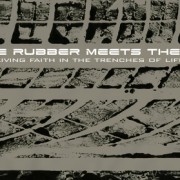For Me, a Real Game-Changer
Ten days ago I was really struggling. That Wednesday night Bible study had been a real chore, a heavy task. Emotionally, I can say that I was a real mess.
Background: my wife and I are taking a step of faith that for me is probably the biggest step I’ve taken since I left Southern California 34½ years ago for the Monterey Peninsula (with two Volkswagen Bugs, some clothes, furniture, and $125 in the bank; no job and no certainty about where we’d be living beyond the first few weeks.)
This current step is in that same category, albeit the circumstances differ.
In my August 18 journal entry I wrote: “I’ve been hugely busy/preoccupied/worried about all the changes—the new house, all the work involved, the transition, provision for the future… yet, I have strongly sensed that this next season is of the Lord.”
In view of my calling, the Lord then began to remind me that I need to draw near to Him, that I need to be more a man of prayer and meditation (upon His word). My “doing” must and will proceed from my “being.”
Then I read and prayed through Jeremiah 32, part of that morning’s reading. This passage was a game-changer for me. As He always has whenever big things are in the works, He spoke to me through His word.
Perhaps you may need a bit of re-familiarization with its story line … but basically the story of Jeremiah 32 concerns the last days of Judah before the Babylonian captivity and destruction of Jerusalem. The armies of Babylon had been laying siege against the holy city, and things were desperate. Jeremiah himself was held under guard by the wicked king Zedekiah.
It was at that time that the word of the LORD came to Jeremiah, telling him to purchase a field from his cousin Hanamel, a field which Jeremiah had the right to redeem. The message of this purchase was that once again, even though Jerusalem would be destroyed and the people taken captive, the Israelites would purchase properties and vineyards in the land.
Jeremiah was perplexed by this prophecy. He didn’t understand how this would happen, though he didn’t doubt God’s power to make it happen.
In his prayer, the prophet acknowledged that the LORD:
- Created everything and is omnipotent.
- Is merciful and gracious and just (the meaning of God’s name, Exodus 34:6-7).
- Did great things in the past (reviewing their history coming out of Egypt and into the land).
Yet, the people had sinned greatly, and thus the Babylonians had surrounded the city. The inevitable was happening! So Jeremiah says to the LORD as he concludes his prayer “See how the siege ramps are built up to take the city. Because of the sword, famine and plague, the city will be handed over to the Babylonians who are attacking it. What you said has happened, as you now see. {25} And though the city will be handed over to the Babylonians, you, O Sovereign LORD, say to me, ‘Buy the field with silver and have the transaction witnessed.’”
Again, Jeremiah was stumped by the “how.” How will these things happen? How will it work out that Israel will once again be in the land to buy, sell, and live? Graciously, the LORD answered Jeremiah’s concerns.
As I realized the depth of Jeremiah’s implied question, peace began to flood my soul. I was able to let go of all my “how are You going to do this?” questions, and leave the how to the Lord. I was able to rid my very busy mind of things that are too wonderful for me.
The words of one of David’s psalms came into my mind: “My heart is not proud, O LORD, my eyes are not haughty; I do not concern myself with great matters or things too wonderful for me. {2} But I have stilled and quieted my soul; like a weaned child with its mother, like a weaned child is my soul within me” (Psalms 131:1-2).
Now I’ve got my work cut out for me, but now it’s a work of faith, springing forth from faith. It’s no longer the work of self-effort or independence. It’s the work of a child trusting in His Father.
I’m not so naïve as to think that what I’ve re-realized will not be tested, but I’m sure happy that the Lord has spoken!
God bless you. May He direct you into His peace and hope (Romans 15:13).









